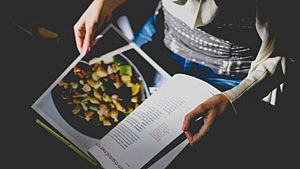Meal planning: Saving time, money and reducing food-waste
In our busy lives, deciding what to feed ourselves and our families, having the right food in, and finding time to cook can be a real struggle. At the end of a long day, working out what to put on the table can sometimes be the thing that tips us over the edge. We find ourselves turning to take-away, or grabbing what we can on the way home, which can lead to wasting food and spending more time and money than we need to, without getting the healthy, balanced meals we want. APDO member and productivity specialist Karen Eyre-White (Go Do) is here to share her meal planning process to help us get organised and take some of the stress out of mealtime.Step 1 - Schedule time to plan
Taking 30 minutes each week to plan out the next week's meals can really help you feel in control. It doesn't need to feel like a chore; sitting down with a glass of wine or cup of tea is a great way to relax during a busy week and be productive at the same time. This is also a great time to sift through some of your old recipe books that haven't been opened in a while!Step 2 - Check your diary
One common mistake that you don't want to make is planning for food that you won't be home to eat. So, before you start, take a look at your diary. Which nights are you out and therefore not eating at home? Which nights are all the kids at after-school activities and you'll need to rustle something up in 15 minutes? Be sure to choose meals which fit with the time and amount of people home for dinner.Step 3 - Check your Cheat-sheet!
Create a list of old faithful meals which you can look at for inspiration, and mix in some new recipes every now and then. BBC Good Food has a great collection of recipes for all cuisines and budgets, or try Yummy Toddler Food for kids. Don't be over-ambitious, you don't need to plan culinary masterpieces for every night of the week (or, indeed, for any). It can also be helpful to choose meals which complement each other. Perhaps the leftovers from one meal can be used as the next day's lunch, or if a recipe calls for half a bag of spinach and you can use the rest for a meal later in the week. Not only does this reduce food waste, it also saves money. Build in at least a night a week to eat something from the freezer, or for something really simple. This is very flexible so if you find yourself with extra leftovers, or an invitation out to dinner, you can take full advantage.
Step 4 - Make a list
Make your plan in good time ahead of food shopping for the week and as you choose your meals create your shopping list. This way, you can add things to the list that you may have forgotten when you originally made it. If you find supermarkets stressful, or find yourself tempted by food you probably won't eat (or eat too much of!), most big name shops have home delivery services. If you plan it enough in advance you can avoid high delivery charges and it saves a lot of the time and the hassle of battling the grocery store.Step 5 - Make it fun
If you have children, involving them in your meal planning can make the process a positive experience. Sometimes it can help children to have some predictability about food, so think up an easy schedule like Meat Free Mondays, Tortilla Tuesdays, or even Waste Wednesdays for using up anything spare you've got in the fridge. Not only are you integrating more quality time together, but you're also teaching them valuable skills for when they're living on their own. For more ideas on integrating your children into the kitchen and cooking process, check out our recent blog, Play with your food - cooking with children. Feeding yourself and your family can feel overwhelming, but by following these steps you can take the stress out of it, and go into the week feeling confident. Happy planning!
Feeding yourself and your family can feel overwhelming, but by following these steps you can take the stress out of it, and go into the week feeling confident. Happy planning!
It's National Organising Week 2019 and APDO's 15th birthday celebration! We would love for you to join in the fun by following us on our social media channels. If we've inspired you to #loveyourleftovers with this post please tag us with our hashtag #NOWorganise so we can see what you've been up to!
